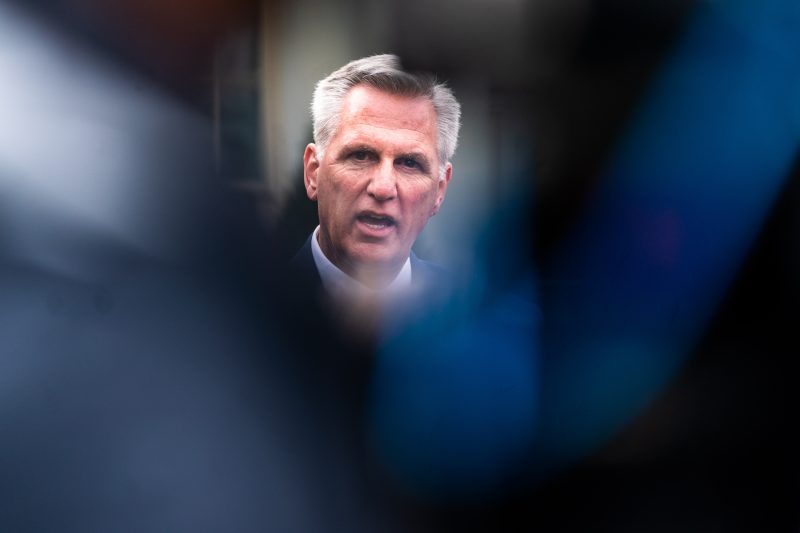The math isn’t adding up right now for Kevin McCarthy (R-Calif.) to become House speaker. And perhaps as worryingly for him, the New York Times reports that not even lobbying from former president Donald Trump appears to be swaying the most stubborn holdouts in McCarthy’s party.
But there’s a long way to go in McCarthy’s second quest for the speakership. (The vote will take place Jan. 3.) The situation can change, and posturing is a thing in politics.
And he does have one thing working in his favor, particularly if his critics continue to struggle to find a viable alternative: McCarthy simply isn’t a lightning rod with the conservative base.
To be clear, McCarthy is not a beloved figure, even within the GOP. But polls suggest he hardly engenders the kind of distaste that leaders in his position often do. (By the end of Rep. John A. Boehner’s tenure as speaker, for example, a CNN poll showed that more than 6 in 10 Americans thought he should be replaced.) And that’s true most importantly with the Republican grass roots.
A new Monmouth University poll shows McCarthy is basically an undetermined quantity to most Americans, with about half not offering an opinion of him. Overall, the numbers aren’t good: Twelve percent of Americans approve of him, while 34 percent disapprove.
But among Republicans, McCarthy is at least in positive territory, with relatively few detractors. Around 3 in 10 Republicans approve of him, and around 2 in 10 disapprove.
That’s a contrast to the GOP leader of the other chamber, Senate Minority Leader Mitch McConnell (Ky.). The same poll showed around the same number of Republicans approved of him (25 percent), but his disapproval among his own party was more than twice as high: 48 percent.
(McConnell maintained his position after the 2022 election, but he didn’t face as steep a climb as McCarthy does to become speaker because he only had to win over a majority of the Senate GOP caucus. Only 10 Senate Republicans voted for his challenger, Sen. Rick Scott of Florida.)
Other polling from before the 2022 election also bears out McCarthy’s relatively good — with the key word being “relatively” — position.
NBC’s final poll before the election showed 25 percent of Republicans had a positive view of McCarthy, vs. just 11 percent who had a negative view.
A July Pew Research Center poll showed that Republican-leaning voters had a net-unfavorable opinion of McConnell by a 50-to-32 margin, but were slightly favorable on McCarthy, 34 to 29.
Things were even better for McCarthy in a late 2021 poll, when Gallup asked Americans to rate many top U.S. government figures. McCarthy earned the approval of 46 percent, to 49 percent disapproval. Those are pretty middling numbers but were at least better than those of any other congressional leader, including House Speaker Nancy Pelosi (D-Calif.).
The same poll showed that while fewer than half of Republicans approved of McConnell, 71 percent approved of McCarthy.
Why would 71 percent of Republicans approve of McCarthy in one poll, but just 3 in 10 do so in a poll a year later? Much of that is likely because different pollsters have varying approaches when it comes to getting people to choose a response; the Monmouth poll offered an explicit “no opinion” option, for example, which many took.
It’s also possible that more Republicans are reserving their judgment on McCarthy, now that he’s in line to become speaker.
But that’s also kind of the point. Whatever true resistance to McCarthy exists, it’s mostly relegated to a small portion of the GOP base — around a quarter of the party — and a handful of members seeking to make a point or earn concessions on House rules. Those members could indeed be enough to sink his bid for speaker if they hold strong, but there is plenty to play out. A couple of them have already suggested that they could be swayed under certain circumstances.
And if the GOP struggles to find a real alternative who can unite the party — the alternative, as with McCarthy, could afford to lose only a small handful of GOP votes — McCarthy could be well-positioned to make the case that he’s an acceptable enough candidate for the job. At the very least, the members who vote for him wouldn’t have to worry about some kind of immediate backlash from the grass roots.
McCarthy’s tenure as the House GOP leader is one marked by wholly unsteady stewardship of the GOP conference. He often seems to be doing whatever he can just to get by, rather than truly leading on much of anything — as was most evident in his quick reversal after initially blaming Trump for the events of Jan. 6, 2021.
But Trump in particular seems to appreciate McCarthy’s willingness to do what it takes to maintain power (provided that includes kowtowing to Trump, of course). And McCarthy’s ability to make himself acceptable to the base — or at least not anathema — even after sharply criticizing Trump post-Jan. 6 is not something many other Republicans can claim. Whatever you think of McCarthy, he’s nothing if not an amiable politician.
Come Jan. 3, we’ll see if he’s acceptable enough to his conference.








